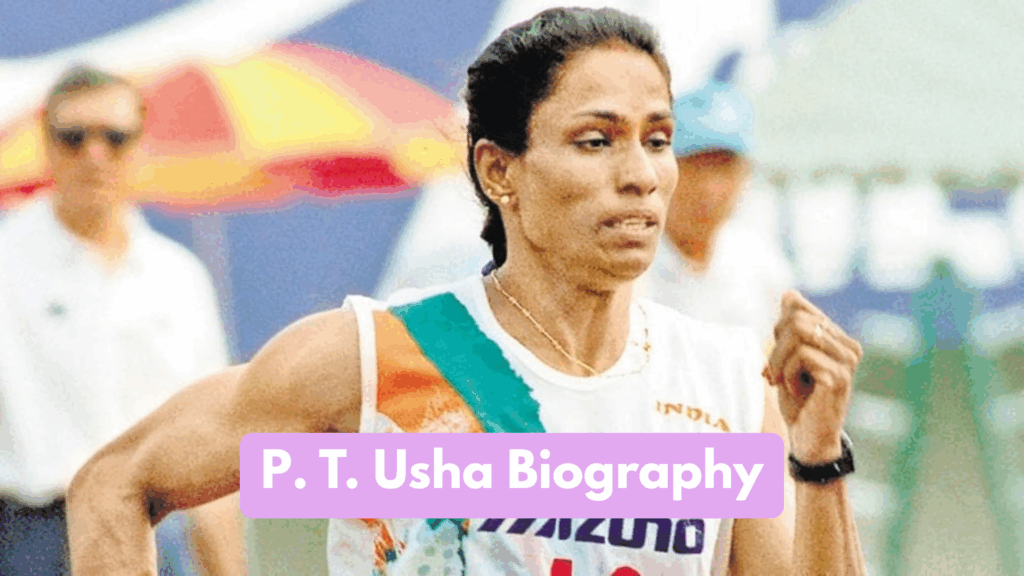P. T. Usha Biography: Husband, Awards, Wikipedia, Age, Net Worth, Stats

When we speak about Indian athletics, few names shine as brightly as P. T. Usha, rightly nicknamed the “Payyoli Express”. Born in a small village in Kerala, she rose to become one of India’s greatest track-and-field athletes, and later a sports administrator and role model for many. In this article, we’ll explore her early life, athletic career, later roles, achievements, and legacy. We’ll also answer some frequently asked questions about her journey.
Early Life and Background
Pilavullakandi Thekkeparambil Usha was born on 27 June 1964 in the village of Payyoli in the Kozhikode district of Kerala. She came from a modest family — her father a farmer and her mother a homemaker — and she was one among several siblings. Her early interest in athletics emerged during school days, and she was discovered by renowned coach O. M. Nambiar at a young age. It is in Payyoli that she acquired the moniker “Payyoli Express” because of her blistering speed on the track.
Breakthrough into Athletics
Usha’s ascent in athletics can be traced from her school and district meets to international competitions. In 1978, she made a mark at the National Inter-State Meet in Kollam. By 1980, at age 16, she represented India in the 1980 Summer Olympics in Moscow. Two years later, in the 1982 Asian Games in New Delhi, she won silver medals in the 100 m and 200 m events, signalling her arrival on the Asian athletics scene.
Peak Athletic Career
The mid-1980s were the golden period of her athletic career. At the 1984 Summer Olympics in Los Angeles, Usha reached the final of the 400 m hurdles and finished 4th—missing the bronze by just one hundredth of a second. At the 1985 Asian Championships in Jakarta, she won five gold medals (100 m, 200 m, 400 m, 400 m hurdles, 4×400 m relay) and a bronze, setting a record for most golds by a female athlete in a single event. In the 1986 Asian Games in Seoul, she won four golds and one silver, further cementing her dominance in Asia. Over her career she collected dozens of medals at Asian Championships and Asian Games, and established many national records.
Achievements & Records
Some of the major highlights of Usha’s athletic achievements include:
- First Indian woman to reach the final of an Olympic athletics event.
- Held the national record in the 400 m hurdles (55.42 s) which stood for many years.
- Won 13 gold medals at the Asian Championships between 1983-89.
- Known by epithets like “Queen of Indian Track & Field”, “Golden Girl”, and of course “Payyoli Express”.
She was also recognised with major honours: the Arjuna Award in 1984 and the Padma Shri in 1985.
Later Career, Administration & Legacy
After retiring from competitive athletics (around 2000), Usha turned her focus to developing young talent. She founded the Usha School of Athletics near Kozhikode, Kerala, to train upcoming athletes. In July 2022, she was nominated to the upper house of the Indian Parliament (Rajya Sabha) and in December 2022 became the first woman to be elected President of the Indian Olympic Association (IOA). Her story continues to inspire countless young athletes — especially girls — in India and beyond, showing that with talent, grit, and support even humble beginnings can lead to exceptional achievements.
Personal Life
Usha married V. Srinivasan (a former athlete and coach) on 25 April 1991. She has a son, and has chosen to stay largely out of the frenzied celebrity spotlight, focusing instead on sport, mentorship and giving back.
Challenges & Triumphs
Her journey was not without obstacles: growing up in a modest family, limited resources, and world-class athletes to compete against. Yet she overcame them with dedication. Missing the Olympic bronze by one hundredth of a second in 1984 was a heartbreak, but also a defining moment — it put Indian women’s athletics on the global map. Her legacy is not just medals, but the shift in perception of women in sport in India, inspiring generations to aim high.
Why PT Usha Still Matters
- She broke gender and regional barriers in Indian sport.
- Her achievements set national benchmarks and motivated sports infrastructure and training in India.
- As a leader in sports administration she helps shape policy and opportunities for athletes.
- Stories of her humble origins make her relatable and motivational.
FAQs
Q1. Did PT Usha win an Olympic medal?
No — although she finished 4th in the 400 m hurdles at the 1984 Olympics, she narrowly missed a bronze by one-hundredth of a second.
Q2. Why is she called the “Payyoli Express”?
Because she hails from the village of Payyoli (in Kerala) and her speed on the track was likened to a train — hence the affectionate nickname.
Q3. What are some of her biggest records or medals?
She won five gold medals at the 1985 Asian Championships in Jakarta; at the 1986 Asian Games she collected four golds and one silver; also set long-standing national records in hurdles and sprints.
Q4. What is she doing now?
She runs the Usha School of Athletics in Kerala to train young talent; she is also leading the IOA as its President and serving as a nominated member of the Rajya Sabha.
Q5. What makes her journey especially significant for women?
She showed that women from rural areas in India could reach global sports stages, challenged norms, and now holds leadership roles in sports governance where women have been under-represented.
Conclusion
P. T. Usha’s life is a testament to what can be achieved with talent, hard work and perseverance. From the dusty tracks of Payyoli to the global stage of the Olympics, and now to the halls of sports administration, her journey encapsulates inspiration. Even though she narrowly missed an Olympic medal, her legacy becomes richer each day — through the young athletes she mentors, the records she set, and the barrier-breaking leadership she demonstrates. For every aspiring athlete, for every young girl dreaming of a bigger world, Usha’s story lights a path forward.


